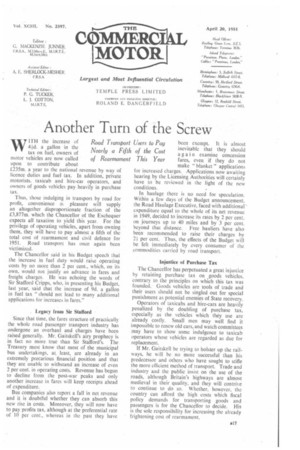Another Turn of the Screw
Page 51

If you've noticed an error in this article please click here to report it so we can fix it.
WITH the increase of 41d. a gallon in the tax on fuel, owners of motor vehicles are now called upon to contribute about £235m. a year to the nationalrevenue by way of licence duties and fuel tax. In addition, private motorists, taxicab and hire-cal operators, and owners of goods vehicles payheavily in purchase tax.
Thus, those indulging in transport by road for profit, convenience o, pleasure will supply an altogether disproportionate fraction of the £3,877m. which the Chancellor of the Exchequer expects all taxation to yield this year. For the privilege of operating vehicles, apart from owning them, they will have to pay almost a fifth of the total cost of rearmament and civil defence for 1951. Road transport has once again been victimized.
The Chancellor said in his Budget speech that the increase in fuel duty would raise operating costs by no more than 2 per cent., which, on its own, would not justify an advance in fares and freight charges. He was echoing the words of Sir Stafford Cripps, who, in presenting his Budget. last year, said that the increase of 9d. a gallon in fuel tax "should not lead to many additional applications for increases in fares."
. Legacy from Sir Stafford Since that time, the fares structure of practically the whole road passenger transport industry has undergone an overhaul and charges have been raised generally. Mr. Gaitskell's airy prophecy is in fact no more true than Sir Stafford's. The Treasury must know that most of the municipal bus undertakings, at. least, are already in an extremely precarious financial position and that they are unable to withstand an increase of even 2 per cent. in operating costs. Revenue has begun to decline from the post-war peaks and only another increase in fares will keep receipts ahead of expenditure.
Bus companies also report a fall in net revenue and it is doubtful whether they can absorb this new rise in costs. Moreover, they will now have to pay profits tax, although at the preferential rate of 10 per cent., whereas in the past they have
been exempt. It is almost inevitable that they should again examine concession fares, even if they do not make " blanket " applications for increased charges. Applications now awaiting hearing by the Licensing Authorities will certainly have to be reviewed in the light of the new conditions.
In haulage there is no need for speculation. Within a few days of the Budget announcement. the Road Haulage Executive, faced with additional ' expenditure equal to the whole of its net revenue in 1949, decided to increase its rates by 2 per cent. on journeys up to 40 miles and by 3 per cent, eyond that distance. Free hauliers have also been recommended to raise their charges by 2.1. per cent. Thus, the effects of the Budget will be felt immediately by every consumer or the commodities carried by road transport.
Injustice of Purchase Tax The Chancellor has perpetuated a great injustice by retaining purchase tax on goods vehicles, contrary to the principles on which this tax was founded. Goods vehicles are tools of trade and their users should not be singled out for special punishment as potential enemies of State recovery_ Operators of taxicabs and hire-cars are heavily penalized by the doubling of purchase tax, especially as the vehicles which they use are already costly. Small men may well find it impossible to renew old cars, and watch committees may have to show some indulgence to taxicab operators whose vehicles are regarded as due for replacement. • If Mr. Gaitskell be trying to bolster up the railways, he will be no more successful than his predecessor and others who have sought to stifle the more efficient method of transport. Trade and industry and the public insist on the use of the roads, although Britain's highways are almost medieval in their quality, and they will contrive to continue to do so. Whether, however, the country can afford the high costs which fiscal policy demands for transporting goods and passengers is for the Chancellor to decide. His is the sole responsibility for increasing the already frightening cost of rearmament.








































































































































































































